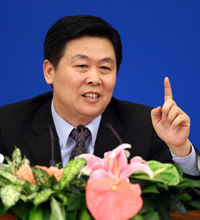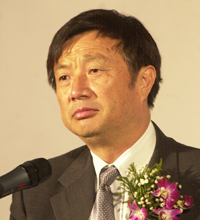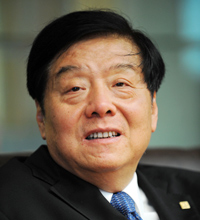| Determined President
 |
|
(CHEN JIANLI) |
Xu Xianming, President of Shandong University, gained public attention when he withdrew from the academic committee of the university.
Xu says his withdrawal shows the determination to remove administrative power from the academic field. Before Xu, presidents of several other universities did the same thing, leaving decision-making power in academic affairs to professors and experts.
"Academic committees should be an important channel for the expression of academics. In China's higher education, administrative forces have replaced and interfered in academic power to a certain extent. I hope my withdrawal can promote the separation between administrative forces and academic power," said Xu.
Xu, 54, graduated with a master's degree in laws in 1985 and then became a teacher in the Law Department of Shandong University in June 1985 and a professor there in 1993. He was president of China University of Political Science and Law from 2001 to 2008 and was appointed president of Shandong University in November 2008.
Influential Business Leader
 |
|
(CFP) |
Ren Zhengfei, President of Huawei Technologies Co. Ltd., ranks first on the latest list of China's Most Influential Business Leaders released by the Chinese version of Fortune magazine, replacing last year's champion Liu Chuanzhi, Chairman of Lenovo Group Ltd.
Ren rose from last year's fourth place to this year's No 1. The number of influential business leaders on the list increased from 25 to 50 this year.
Ren, 67, was born in Guizhou Province. In 1988, he founded Huawei with 20,000 yuan ($3,030) in registered capital and turned it from a small company into one of today's Fortune's top 500 global companies in 2010 with total sales revenues of $28 billion. With total assets of $1.1 billion, Ren ranks 92nd on the 2011 Forbes China Rich List.
GAC's New Chief
 |
|
(CFP) |
Yu Guangzhou, Deputy Secretary of the Communist Party of China (CPC) Fujian Provincial Committee, was appointed new chief of the General Administration of Customs (GAC) by the State Council on April 5, 2011. His predecessor Sheng Guangzu was appointed new minister of railways.
Yu, 58, was born in east China's Jiangsu Province and graduated from the Party School of the CPC Central Committee. Yu was vice governor of Jiangsu Province from 2000 to 2001 and became vice minister of the State Development Planning Commission, predecessor of today's National Development and Reform Commission, from 2001 to 2003. After being vice minister of the Ministry of Commerce from 2003 to 2008, he was the deputy secretary of the CPC Fujian Provincial Committee from 2008 to 2011.
"Chinese residing in Australia have also contributed much to China's reform and opening-up efforts and modernization drive as they are actively engaged in investment in China and supporting Chinese construction and development."
Jia Qinglin, Chairman of the National Committee of the Chinese People's Political Consultative Conference, during a luncheon held by Chinese communities in Sydney, Australia, on April 10
"The United States should reflect more on its own human rights issues rather than acting as a 'preacher of human rights' and stop interfering in other country's internal affairs by issuing its human rights report."
Chinese Foreign Ministry spokesman Hong Lei, commenting after the U.S. State Department released its annual report on China's human rights status
"The pace of Chinese currency's appreciation depends on the country's inflation situation, which will inevitably influence the government's decision."
World Bank chief economist Justin Lin, in an interview with The Wall Street Journal on April 8
"Japanese tourism is facing an unprecedented crisis, but the smile of Chinese tourists will encourage the Japanese people."
Hiroshi Mizohata, Commissioner of the Japan Tourism Agency, emphasizing China is important for Japan to recover its tourism industry at a press conference in Beijing on April 10
"In 2010, the combined contribution of the emerging economies and other developing countries to the global economic growth was close to 60 percent, and their contribution has outnumbered the developed countries."
Hong Pingfan, chief for Global Economic Monitoring of the UN Department of Economic and Social Affairs, in a recent interview with Xinhua News Agency | 